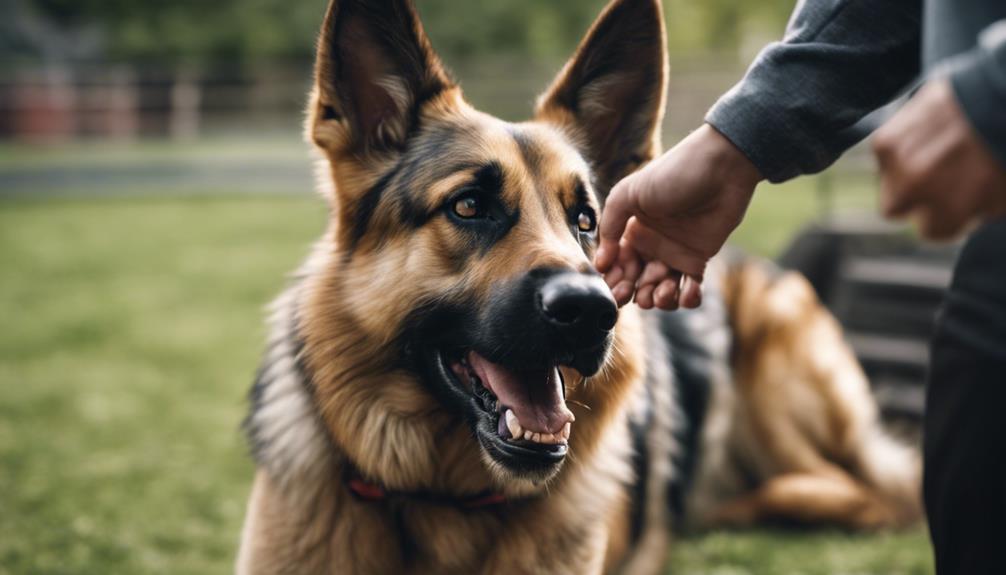🐾 Paw-some Partnership Alert! 🐾
As a pack of German Shepherd enthusiasts at MixGermanShepherd.com, we're always sniffing out the best products for our furry friends. Guess what? When you fetch something from Amazon through our links, we earn a little treat! 🦴
You might have noticed some interesting behaviors in your German Shepherd mix lately; perhaps a bit of resource guarding or excessive jumping. But fear not, for there are effective strategies to address these issues and foster a harmonious relationship with your furry friend. By implementing a few key techniques and understanding the unique characteristics of German Shepherds, you can navigate through these challenges and create a fulfilling bond with your canine companion.
Key Takeaways
- Understanding unique mix behaviors is crucial for tailored solutions.
- Consistent training and socialization help manage aggression and separation anxiety effectively.
- Addressing triggers and providing mental stimulation prevent destructive habits.
- Tailored strategies, positive reinforcement, and recognizing signs aid in behavior management.
Common Behavioral Problems in German Shepherds
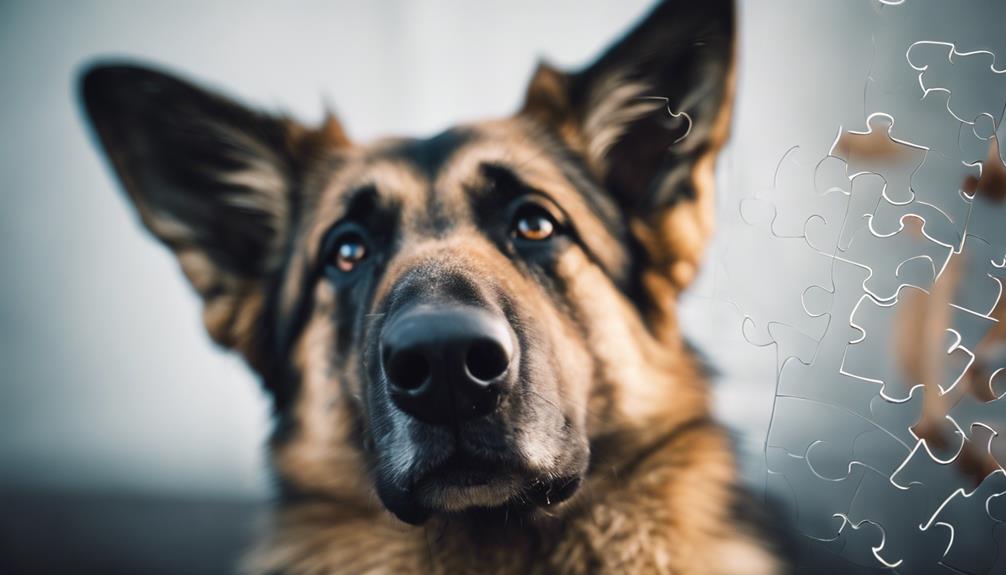
German Shepherds commonly exhibit behavioral problems such as aggression, separation anxiety, and destructive chewing. These issues can also manifest as excessive barking, jumping, and possessiveness in some cases. Understanding the root causes of these behaviors is crucial in addressing and preventing them in German Shepherds. Some of these problems stem from genetic predispositions, while others result from a lack of proper training and socialization.
To tackle aggression, separation anxiety, and destructive chewing, it is essential to provide consistent leadership and structured training to your German Shepherd. Establishing yourself as the pack leader can help curb aggressive tendencies and promote obedience. Socialization from a young age is key to preventing separation anxiety and fostering good behavior in various situations. Additionally, engaging in activities that stimulate your dog mentally and physically can help reduce destructive chewing tendencies. By being proactive in addressing these behavioral issues, you can ensure a harmonious relationship with your German Shepherd.
Understanding German Shepherd Mix Behavior
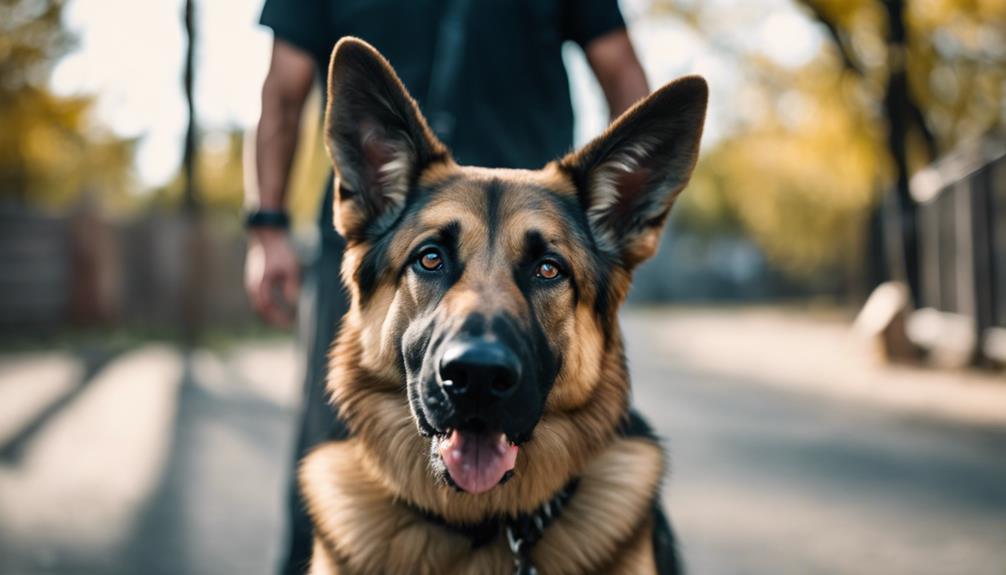
Understanding the behavior of German Shepherd mixes involves recognizing the unique blend of traits inherited from both parent breeds. German Shepherd mixes can exhibit a wide range of behaviors influenced by the characteristics of the other breed in the mix. By understanding the specific mix, you can better predict certain behaviors and tendencies in your dog. Behavioral issues in German Shepherd mixes can vary based on the combination of breeds present. To manage and prevent behavioral problems, training and socialization are key components. Each German Shepherd mix is an individual with its own set of needs and behaviors, requiring tailored approaches to address any issues effectively. By taking the time to understand your German Shepherd mix's background and unique blend of traits, you can create a training and socialization plan that suits their specific needs, ultimately fostering a well-behaved and balanced companion.
Solutions for Aggression in German Shepherd Mixes
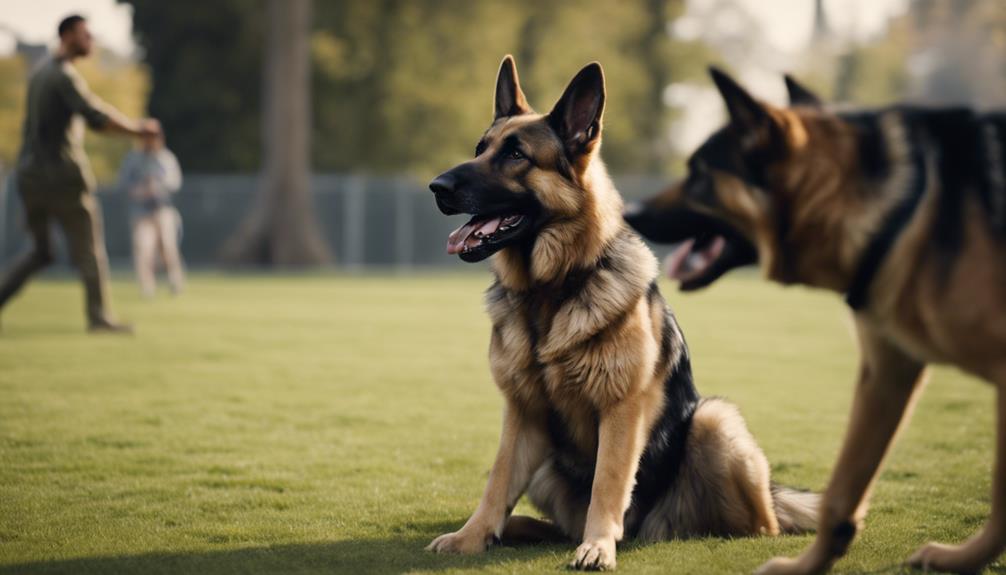
To address aggression in German Shepherd mixes, implementing proper socialization techniques and positive reinforcement training is crucial. Here are some practical solutions to help manage aggression in your German Shepherd mix:
- Socialization: Expose your dog to various environments, people, and animals from a young age to help them feel comfortable and less threatened in different situations.
- Positive Reinforcement Training: Use rewards like treats, toys, and praise to reinforce good behavior and redirect negative behavior positively. This method helps build a strong bond between you and your dog.
- Understanding Triggers and Body Language: Learn to recognize signs of stress or aggression in your dog, such as growling, stiff body posture, or raised hackles. By identifying triggers early, you can take steps to prevent escalation.
Managing Separation Anxiety in German Shepherd Mixes
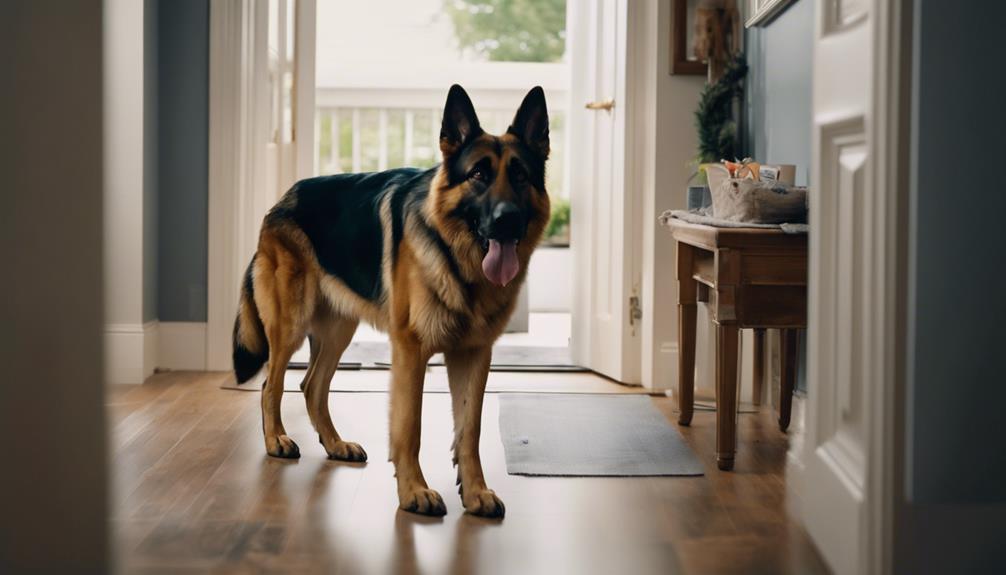
When managing separation anxiety in German Shepherd mixes, implementing consistent routines and providing mental stimulation are key strategies to help alleviate their distress. German Shepherd mixes, known for their loyalty and intelligence, can develop separation anxiety, leading to behaviors like excessive barking, destructive behavior, and house soiling when left alone. To address this, it's crucial to offer mental stimulation through interactive toys, puzzles, or training sessions to keep their minds engaged while you're away. Additionally, gradual desensitization by practicing short departures and gradually increasing the time apart can help them adjust to being alone. Establishing a structured routine for feeding, exercise, and alone time can provide a sense of security for these mixes. In more severe cases, seeking professional help from a dog behaviorist or trainer who understands the individual needs of German Shepherd mixes can offer tailored solutions to manage separation anxiety effectively. Remember, each dog is unique, so finding the right approach that suits your German Shepherd mix is essential in addressing their separation anxiety.
Dealing With Leash Reactivity in German Shepherd Mixes
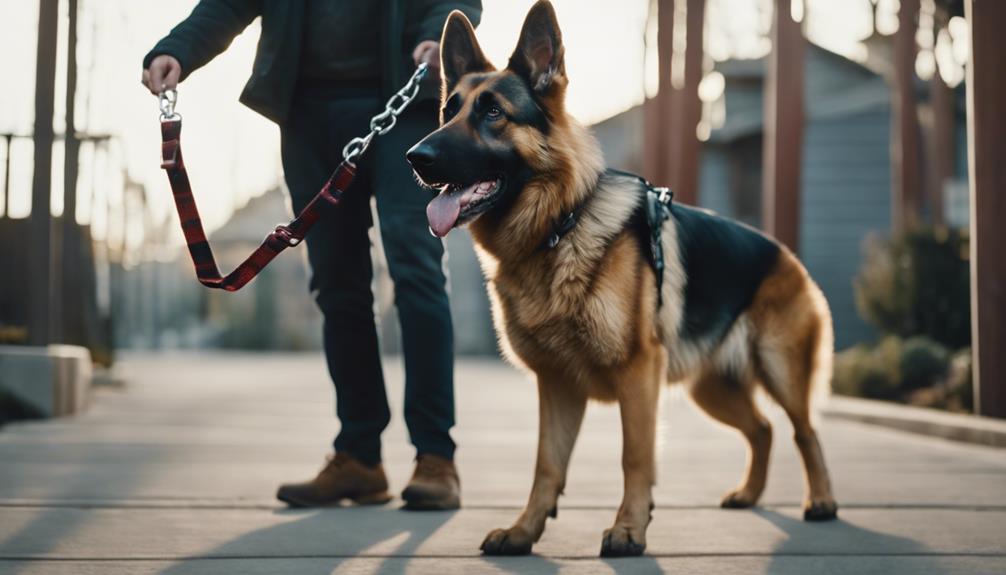
When dealing with leash reactivity in your German Shepherd mix, it's essential to identify triggers for their reactive behavior. By implementing desensitization techniques and positive reinforcement training, you can help your dog become calmer on walks. Consistent training and patience are key components in addressing leash reactivity effectively.
Identifying Triggers for Reactivity
Identifying triggers for reactivity in German Shepherd mixes, particularly when dealing with leash reactivity, is crucial for effectively addressing and managing this behavior. When working with your German Shepherd mix, consider the following:
- Recognize Triggers: Identify specific triggers like other dogs, unfamiliar people, or loud noises that may cause reactivity.
- Address Underlying Causes: Address fear, frustration, or lack of socialization through positive experiences and training techniques.
- Seek Professional Help: Consider consulting a professional trainer or behaviorist for tailored strategies involving desensitization, counter-conditioning, and positive reinforcement to effectively manage leash reactivity.
Understanding and addressing these triggers can significantly improve your German Shepherd mix's behavior on walks.
Training Desensitization Techniques
To effectively address leash reactivity in German Shepherd mixes, implementing desensitization training techniques is crucial for promoting calm behavior during walks. Gradual exposure to triggers, paired with rewarding calm behavior, can help reduce leash reactivity in German Shepherd mixes. Consistent training and positive reinforcement are key components in overcoming this issue. Teaching alternative behaviors like the focus command can redirect your dog's attention during walks, aiding in managing leash reactivity. Seeking assistance from a professional trainer is advisable as they can provide specialized strategies tailored to your German Shepherd mix's specific needs. By following these steps and staying patient and persistent, you can work towards mitigating leash reactivity in your beloved pet.
Implementing Positive Reinforcement Training
Positive reinforcement training plays a crucial role in addressing leash reactivity in German Shepherd mixes by rewarding desired behaviors with treats or praise. To effectively implement positive reinforcement training for leash reactivity in your German Shepherd mix, consider the following:
- Consistency: Consistently reward your dog for positive behavior to reinforce good habits.
- Patience: Be patient and understanding, as changing behavior takes time and effort.
- Associate positive experiences: Use treats and praise to create positive associations with being on a leash, helping your German Shepherd mix feel more comfortable and secure.
Nipping and Chewing Solutions for German Shepherd Mixes
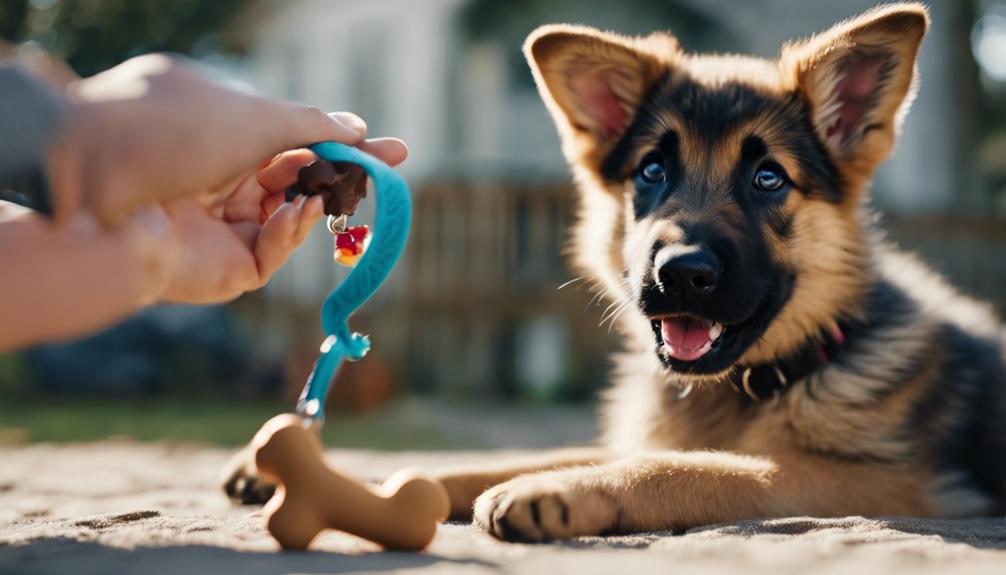
To address nipping and chewing behaviors in your German Shepherd mix, start by redirecting biting behavior towards appropriate chew toys. Consistent training techniques, such as positive reinforcement and interactive toys, can help deter destructive chewing habits. Providing mental stimulation and socialization opportunities will also aid in channeling your dog's energy positively and reducing nipping issues.
Redirecting Biting Behavior
When addressing biting behavior in German Shepherd mixes, focus on redirecting their natural herding instincts towards appropriate chew toys and interactive play. To effectively manage nipping and chewing in your German Shepherd mix, consider the following strategies:
- Positive Reinforcement: Use treats and praise to reinforce good behavior and teach your dog what is acceptable to chew on.
- Consistent Training: Implement regular training sessions to establish boundaries and correct biting habits.
- Supervision: Keep a close eye on your German Shepherd mix, especially during playtime, to intervene and redirect any inappropriate chewing behavior promptly.
Providing Appropriate Chew Toys
To effectively address nipping and chewing behaviors in your German Shepherd mix, it is essential to provide a variety of appropriate chew toys to satisfy their innate need to chew and prevent destructive habits. German Shepherds, known for their herding instincts, require interactive toys and durable chew items to keep them engaged. Supervised play with chew toys is crucial in redirecting their chewing behavior and avoiding destructive habits. Regularly rotating chew toys not only prevents boredom but also helps deter unwanted chewing behavior in your German Shepherd mix. By offering a range of chew toys and engaging your dog in supervised play, you can effectively manage nipping and chewing tendencies, promoting both mental stimulation and positive behavior.
Consistent Training Techniques
Consistently employing training techniques is essential for addressing nipping and chewing behaviors in your German Shepherd mix. Here are some strategies to help you manage these behaviors effectively:
- Redirecting: When your German Shepherd mix starts nipping or chewing inappropriately, redirect their attention to a suitable chew toy.
- Positive Reinforcement: Reward good behavior with treats or praise to reinforce appropriate chewing habits.
- Consistent Corrections: Correct your dog every time they engage in destructive chewing, showing them what is acceptable.
Frequently Asked Questions
Why Is My German Shepherd so Badly Behaved?
If your German Shepherd is badly behaved, consider training techniques, socialization tips, exercise requirements, and mental stimulation. Understanding triggers, genetic influences, and the need for a leadership role is crucial. Seek professional help for consistent discipline and positive reinforcement.
Do German Shepherds Have Behavioral Issues?
German Shepherds can have behavioral issues like aggression or separation anxiety. Consistent training, socialization, and understanding their needs are crucial. You need to provide proper outlets for their energy, use positive reinforcement, and establish strong leadership skills.
What Is the Behavior of a German Shepherd Mix?
When considering the behavior of a German Shepherd mix, remember to focus on training techniques, socialization tips, exercise needs, mental stimulation, separation anxiety, communication cues, dominance behaviors, leash manners, resource guarding, and fear responses. It's essential for a balanced approach.
Are German Shepherd Mix Aggressive?
Are German Shepherd mixes aggressive? Aggression triggers vary, but training techniques, socialization benefits, temperament evaluation, breed-specific challenges, behavior modification, genetic predispositions, obedience classes, positive reinforcement, and professional guidance can help manage and reduce aggression effectively.
Conclusion
In conclusion, by understanding the behavioral issues faced by German Shepherd mixes and implementing effective solutions such as training, providing appropriate outlets for their energy, and seeking professional help when needed, you can help your furry companion become a well-adjusted and happy member of your family. Just as a skilled sculptor shapes a block of marble into a masterpiece, with patience and dedication, you can mold your German Shepherd mix into a well-behaved and contented companion.
